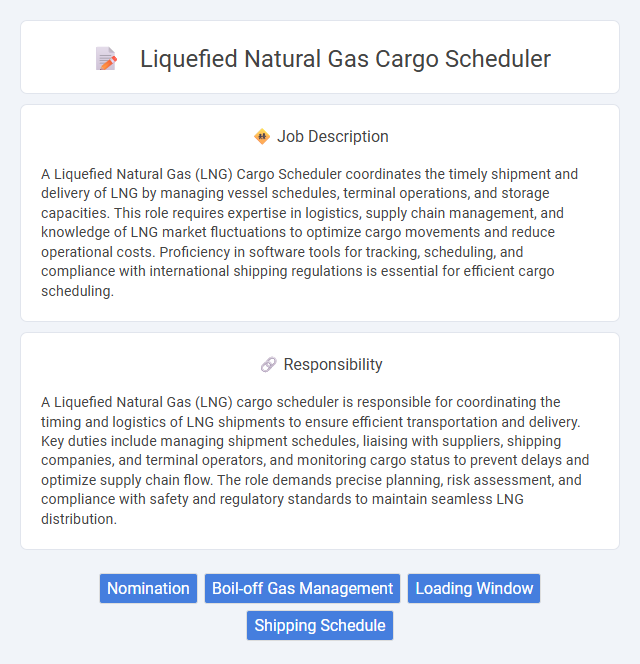
A Liquefied Natural Gas (LNG) Cargo Scheduler coordinates the timely shipment and delivery of LNG by managing vessel schedules, terminal operations, and storage capacities. This role requires expertise in logistics, supply chain management, and knowledge of LNG market fluctuations to optimize cargo movements and reduce operational costs. Proficiency in software tools for tracking, scheduling, and compliance with international shipping regulations is essential for efficient cargo scheduling.
People with strong organizational skills and the ability to manage high-pressure situations are likely suitable for a liquefied natural gas cargo scheduler position. Those who prefer structured environments and can maintain attention to detail throughout complex logistics processes may find this role aligns with their strengths. Individuals who struggle with fast-paced decision-making or coordinating multiple tasks simultaneously might face challenges in this job.
Qualification
A Liquefied Natural Gas (LNG) Cargo Scheduler must have a strong background in logistics, supply chain management, or petroleum engineering, typically holding a bachelor's degree in these fields. Expertise in LNG operations, scheduling software, and real-time tracking systems is essential to efficiently coordinate cargo movements and ensure timely deliveries. Proficiency in risk assessment, regulatory compliance, and effective communication skills are critical for managing complex LNG transport schedules and mitigating operational disruptions.
Responsibility
A Liquefied Natural Gas (LNG) cargo scheduler is responsible for coordinating the timing and logistics of LNG shipments to ensure efficient transportation and delivery. Key duties include managing shipment schedules, liaising with suppliers, shipping companies, and terminal operators, and monitoring cargo status to prevent delays and optimize supply chain flow. The role demands precise planning, risk assessment, and compliance with safety and regulatory standards to maintain seamless LNG distribution.
Benefit
A Liquefied Natural Gas (LNG) cargo scheduler job likely offers benefits such as competitive salary packages and opportunities for career growth in the energy sector. The role may provide exposure to global logistics and supply chain management, enhancing professional skills and industry knowledge. Work-life balance and health benefits could also be probable incentives, given the specialized nature of the position.
Challenge
Managing a liquefied natural gas (LNG) cargo scheduler role likely involves coordinating complex logistics under tight deadlines and fluctuating market demands, making operational challenges common. The position probably requires adapting to unpredictable variables such as weather conditions, port availability, and regulatory compliance, increasing the difficulty of maintaining optimal scheduling. Balancing multiple stakeholders' expectations while minimizing delays and costs might represent a constant source of pressure and complexity.
Career Advancement
A Liquefied Natural Gas (LNG) cargo scheduler manages complex logistics to optimize shipping routes and delivery timelines, ensuring efficient and safe transport of LNG shipments worldwide. Mastery of supply chain coordination, real-time tracking technologies, and risk management in this role enables professionals to progress into senior operations management or strategic planning positions within the energy sector. Expertise in LNG market dynamics, compliance standards, and advanced scheduling software significantly enhances career advancement opportunities in global LNG trading and maritime logistics companies.
Key Terms
Nomination
An LNG cargo scheduler specializing in nominations manages the precise timing and quantities of liquefied natural gas deliveries to meet contractual obligations and optimize supply chain efficiency. This role requires in-depth knowledge of LNG market dynamics, shipping logistics, and regulatory compliance to ensure seamless coordination between suppliers, transport vessels, and receiving terminals. Effective nomination management reduces demurrage costs and supports accurate forecasting for production and delivery schedules.
Boil-off Gas Management
Managing boil-off gas (BOG) is a critical responsibility for a Liquefied Natural Gas (LNG) cargo scheduler, ensuring safe and efficient cargo transport. The scheduler optimizes BOG utilization by coordinating compression, reinjection, and reliquefaction processes to minimize cargo loss and maintain vessel stability. Precise forecasting and real-time monitoring help balance boil-off rates with cargo temperature, ensuring compliance with safety standards and maximizing operational efficiency.
Loading Window
A Liquefied Natural Gas (LNG) cargo scheduler plays a critical role in managing the Loading Window to optimize vessel turnaround time and ensure precise timing for loading operations. Effective scheduling of the Loading Window involves coordinating with terminal operators, shipping agents, and vessel crews to align berth availability, cargo readiness, and safety protocols. Advanced scheduling software and real-time data analytics are utilized to minimize delays, optimize resource allocation, and maintain compliance with maritime regulations.
Shipping Schedule
Liquefied natural gas cargo schedulers manage complex shipping schedules to ensure timely and efficient LNG delivery across global markets. They coordinate vessel departures, berth allocations, and cargo loading times while optimizing routes and minimizing transit delays. Accurate shipping schedules are crucial for balancing supply chain demands and maintaining contractual obligations in the LNG industry.
 kuljobs.com
kuljobs.com